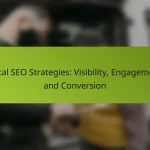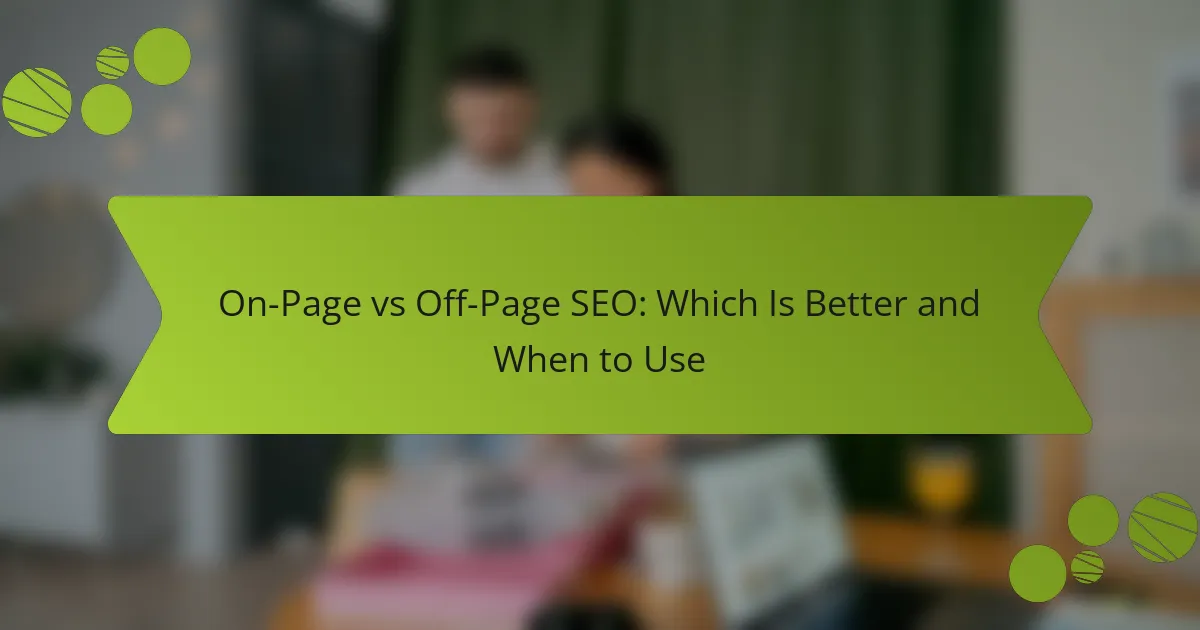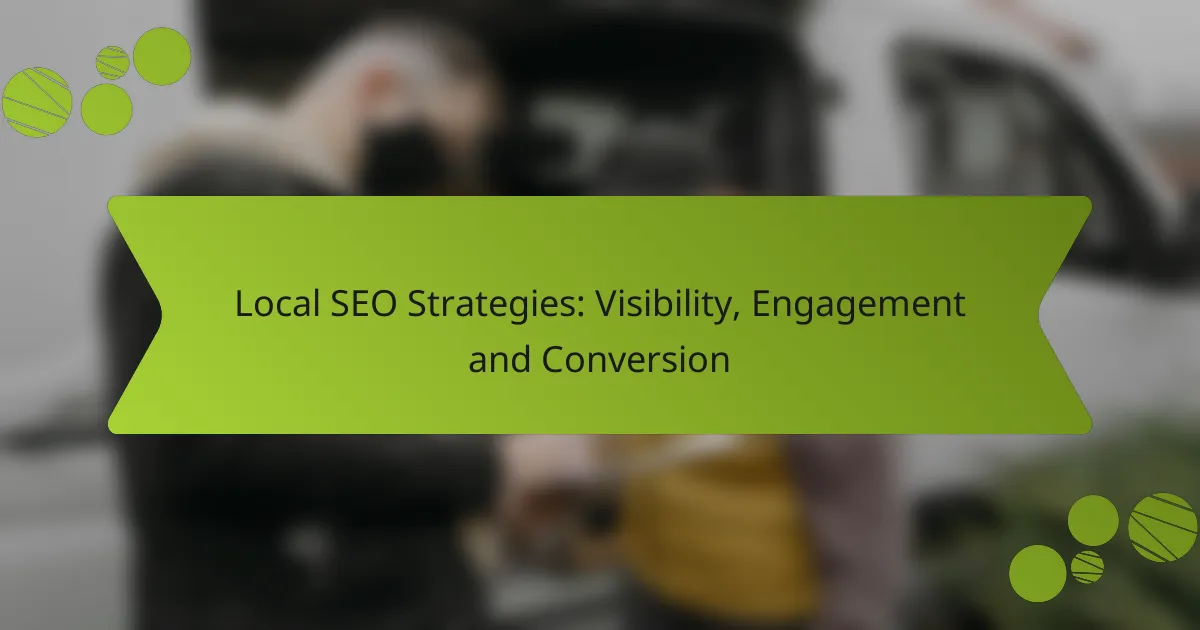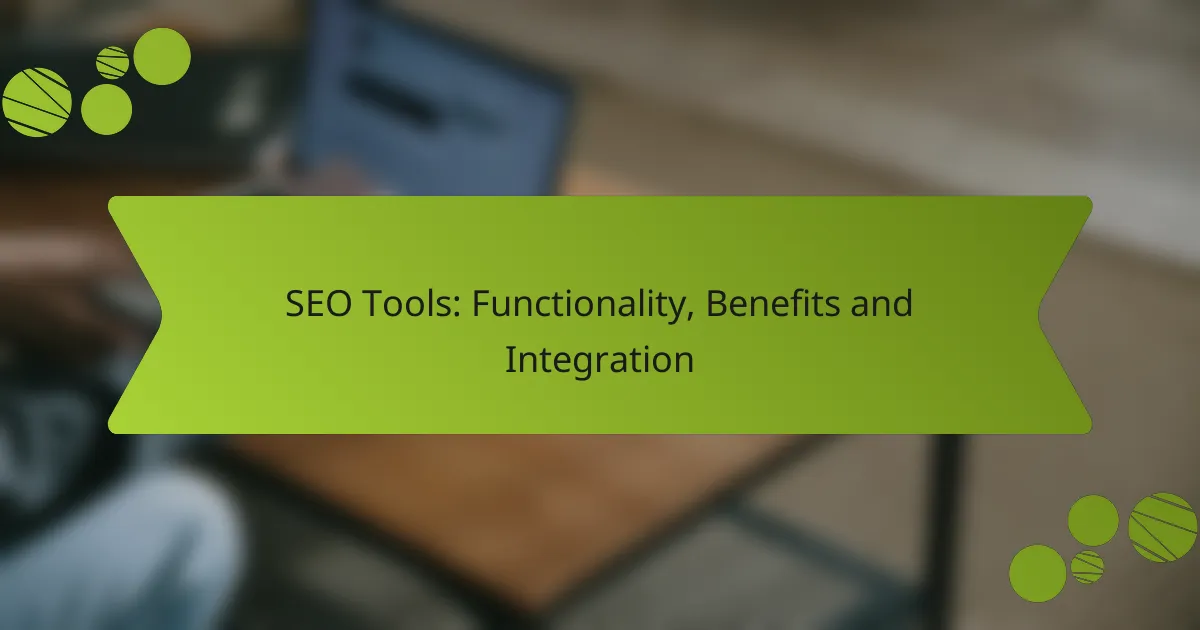On-Page and Off-Page SEO are two critical components of a successful digital marketing strategy, each serving distinct purposes. On-Page SEO focuses on optimizing individual web pages to improve their search engine rankings through content quality and site structure, while Off-Page SEO emphasizes building backlinks and enhancing domain authority from external sources. Understanding when to apply each approach is essential for maximizing your website’s visibility and credibility.
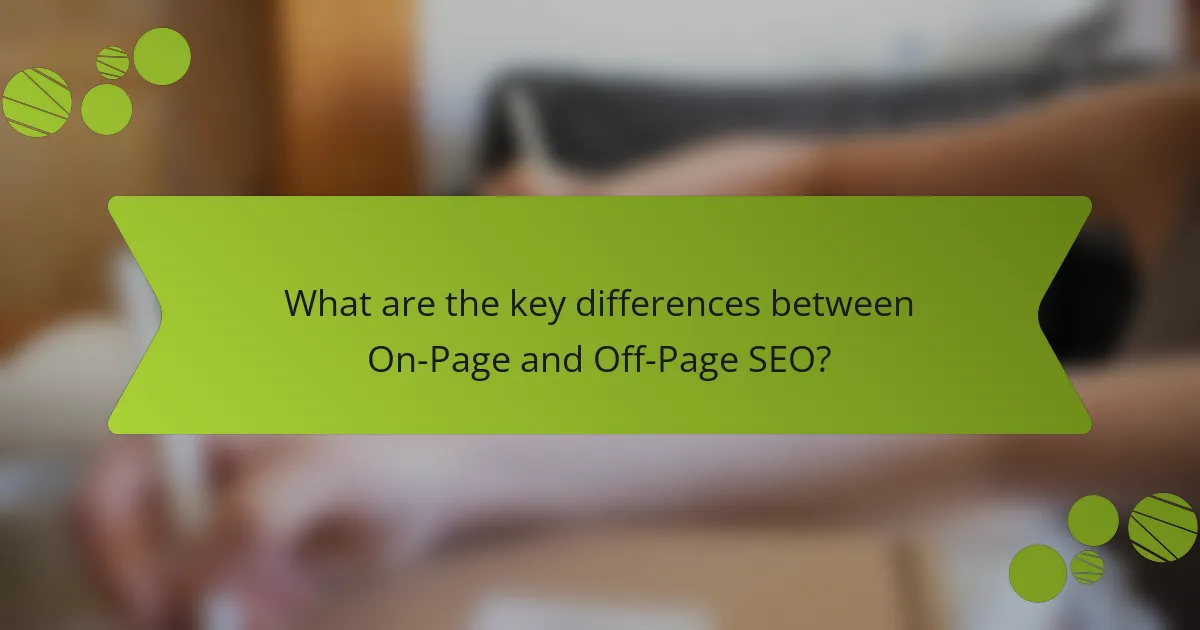
What are the key differences between On-Page and Off-Page SEO?
On-Page SEO refers to the optimization techniques applied directly on a website to improve its visibility in search engines, while Off-Page SEO involves actions taken outside the website, primarily focusing on building backlinks and enhancing domain authority. Understanding these differences helps in strategizing effective SEO efforts.
On-Page SEO focuses on website content and structure
On-Page SEO encompasses all the elements within a website that can be optimized, including content quality, keyword usage, HTML tags, and site architecture. Key practices involve using relevant keywords in titles, headers, and meta descriptions, as well as ensuring a clear and logical site structure that enhances navigation.
For example, a blog post should have a compelling title, engaging content, and proper use of headings to guide readers. Tools like Google Search Console can help identify areas for improvement in on-page elements.
Off-Page SEO emphasizes external factors like backlinks
Off-Page SEO focuses on building a website’s reputation and authority through external means, primarily by acquiring backlinks from other reputable sites. This process enhances a site’s credibility and can significantly influence its ranking in search results.
Common strategies include guest blogging, social media marketing, and influencer partnerships. For instance, earning backlinks from high-authority sites can lead to improved search visibility and increased referral traffic.
On-Page SEO impacts user experience directly
On-Page SEO directly affects how users interact with a website, influencing their experience and satisfaction. Elements such as page load speed, mobile responsiveness, and content readability are crucial for retaining visitors and encouraging engagement.
For example, a site that loads quickly and is easy to navigate will likely keep users on the page longer, reducing bounce rates. Regularly testing and optimizing these factors can lead to better user retention and higher conversion rates.
Off-Page SEO builds domain authority and trust
Off-Page SEO plays a vital role in establishing a website’s domain authority and trustworthiness, which are critical for ranking well in search engines. This is achieved through acquiring backlinks, social signals, and mentions across various platforms.
Building a strong online presence through consistent branding and positive user reviews can enhance trust. Engaging with audiences on social media and participating in relevant online communities can further strengthen a site’s reputation and authority.

When should you use On-Page SEO strategies?
On-Page SEO strategies should be used when you want to optimize individual web pages to improve their rankings in search engine results. This approach focuses on elements like content quality, keyword usage, and site structure to enhance visibility and user experience.
Use On-Page SEO for immediate content optimization
On-Page SEO is ideal for making quick improvements to your content. By optimizing titles, headings, and meta descriptions, you can enhance the relevance of your pages almost instantly. This can lead to better rankings and increased traffic without waiting for external factors to change.
For example, updating a blog post with relevant keywords or improving the readability of your content can yield immediate results in search visibility. Regularly auditing your pages for optimization opportunities is a good practice.
Ideal for targeting specific keywords and phrases
On-Page SEO allows you to focus on specific keywords and phrases that are relevant to your audience. By strategically placing these keywords in your content, headings, and meta tags, you can increase the chances of ranking higher for those terms.
Consider using tools like Google Keyword Planner to identify keywords with reasonable search volume and competition. Aim to incorporate these keywords naturally into your content to avoid keyword stuffing, which can negatively impact your rankings.
Essential for improving site usability and engagement
On-Page SEO plays a crucial role in enhancing site usability and user engagement. Factors such as page load speed, mobile-friendliness, and clear navigation contribute to a better user experience, which can lead to lower bounce rates and higher conversion rates.
To improve usability, ensure that your website is responsive and loads quickly, ideally within a few seconds. Regularly test your site on various devices and browsers to identify any usability issues that may hinder user engagement.

When should you focus on Off-Page SEO techniques?
You should focus on Off-Page SEO techniques when aiming to build long-term authority and credibility for your website. These strategies enhance your site’s visibility and reputation, especially in competitive markets.
Use Off-Page SEO for long-term authority building
Off-Page SEO is essential for establishing your website’s authority over time. This involves earning backlinks from reputable sites, which signals to search engines that your content is valuable. The more high-quality links you acquire, the more authoritative your site becomes.
Consider engaging in guest blogging, influencer partnerships, and social media promotions to build these links. Aim for a diverse backlink profile, as this can improve your site’s trustworthiness and ranking potential.
Important for enhancing brand visibility and reputation
Off-Page SEO plays a critical role in increasing your brand’s visibility and reputation online. By leveraging social media, online reviews, and content marketing, you can reach a broader audience and create a positive brand image.
Encourage satisfied customers to leave reviews and share their experiences on platforms relevant to your industry. This not only boosts your visibility but also fosters trust among potential customers.
Crucial for competitive analysis and backlink strategies
Understanding your competitors’ Off-Page SEO strategies is vital for staying ahead in your niche. Analyze their backlink profiles to identify potential link-building opportunities for your own site.
Utilize tools like Ahrefs or SEMrush to assess where competitors are earning their backlinks. Focus on acquiring links from similar or higher authority sites to enhance your own site’s performance.
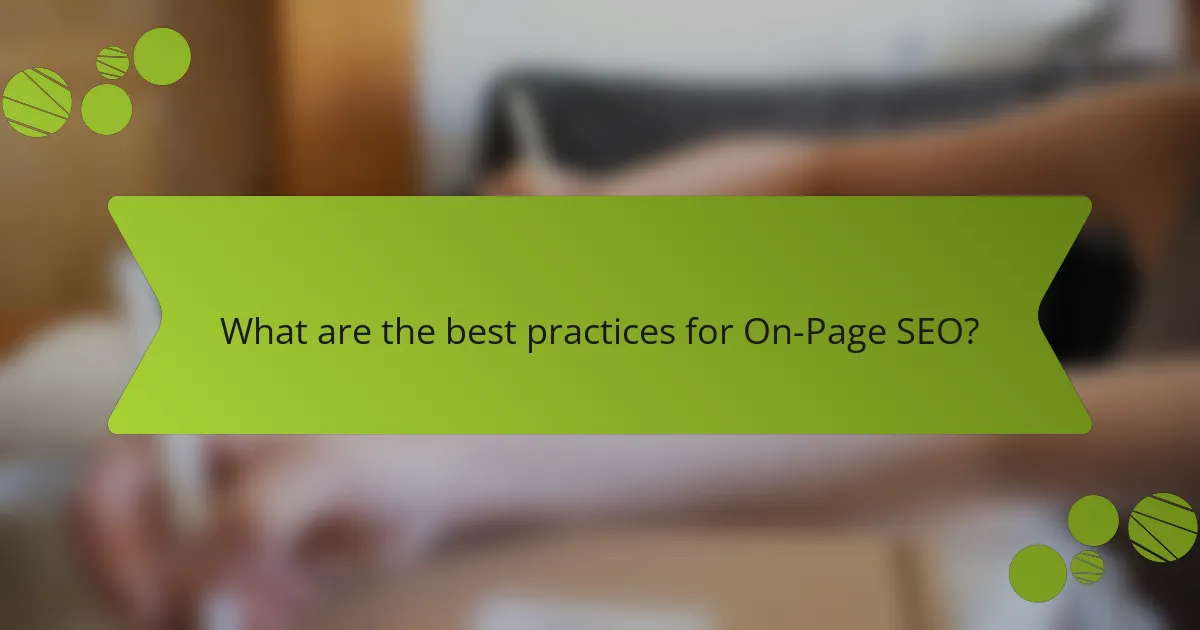
What are the best practices for On-Page SEO?
On-Page SEO refers to the strategies and techniques used directly on your website to improve its ranking in search engine results. Best practices focus on optimizing content, HTML source code, and user experience to enhance visibility and relevance.
Optimize title tags and meta descriptions
Title tags and meta descriptions are crucial for attracting clicks from search engine results. A well-crafted title tag should be concise, ideally between 50-60 characters, and include primary keywords relevant to the page content. Meta descriptions, while not a direct ranking factor, should summarize the page effectively in about 150-160 characters to entice users.
Ensure that both elements are unique for each page to avoid confusion and improve click-through rates. Avoid keyword stuffing; instead, focus on clarity and relevance to the content.
Ensure mobile-friendliness and fast loading times
Mobile-friendliness is essential as a significant portion of web traffic comes from mobile devices. Use responsive design techniques to ensure your site adapts to various screen sizes. Google prioritizes mobile-friendly sites in its rankings, so testing your site with tools like Google’s Mobile-Friendly Test can provide valuable insights.
Fast loading times are equally important, with users expecting pages to load in just a few seconds. Aim for a loading time under three seconds, and consider optimizing images, leveraging browser caching, and minimizing HTTP requests to enhance performance.
Utilize header tags for content hierarchy
Header tags (H1, H2, H3, etc.) help establish a clear content hierarchy, making it easier for both users and search engines to understand the structure of your page. Use H1 for the main title and H2 for major sections, while H3 can denote subsections. This organization not only improves readability but also aids in SEO by signaling the importance of topics.
Incorporate relevant keywords into your header tags, but keep them natural and informative. Proper use of headers can enhance user engagement and decrease bounce rates, contributing positively to your overall SEO strategy.
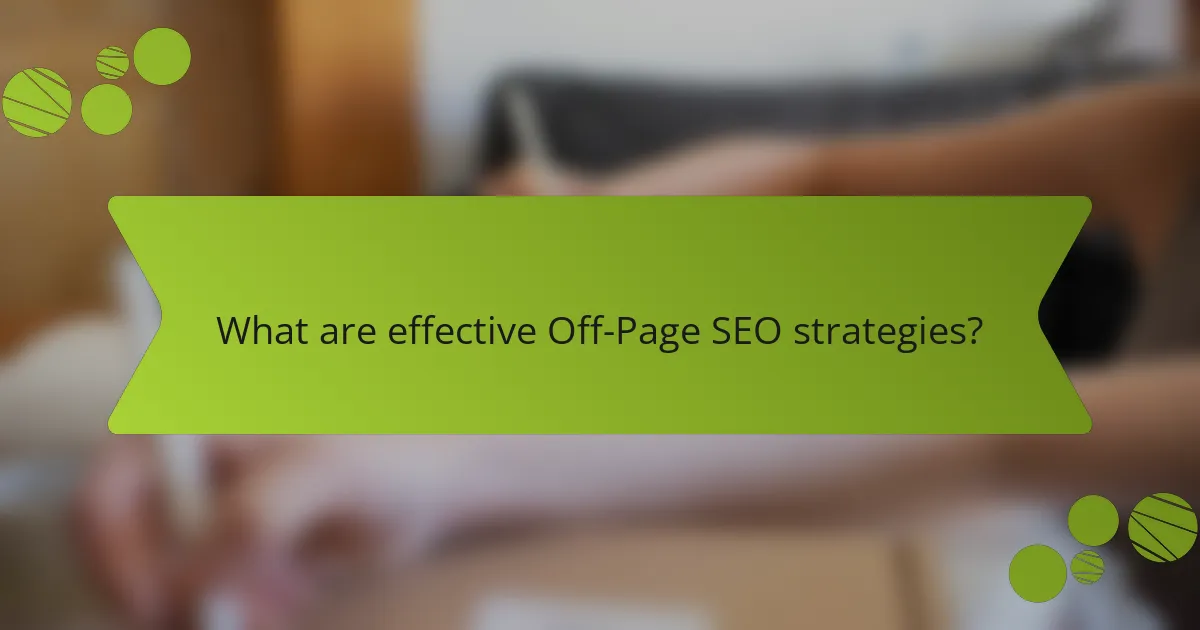
What are effective Off-Page SEO strategies?
Effective off-page SEO strategies focus on enhancing your website’s authority and visibility through external factors. These methods primarily involve building relationships and promoting your brand outside of your own website.
Build high-quality backlinks from reputable sites
Building high-quality backlinks is crucial for improving your site’s authority. Aim for links from reputable websites within your industry, as these carry more weight in search engine algorithms. A good practice is to focus on acquiring links from sites with a high domain authority, which can significantly boost your rankings.
Consider guest blogging, where you contribute articles to other sites in exchange for a backlink. This not only helps with SEO but also establishes your expertise in the field. Keep track of your backlinks using tools like Ahrefs or Moz to ensure they remain relevant and beneficial.
Engage in social media marketing for brand awareness
Social media marketing plays a vital role in off-page SEO by increasing brand awareness and driving traffic to your site. Regularly share engaging content on platforms like Facebook, Twitter, and Instagram to connect with your audience and encourage shares, which can lead to more backlinks.
Utilize targeted ads to reach specific demographics and promote your content. This can enhance visibility and attract potential customers. Monitor engagement metrics to refine your strategy and focus on platforms where your audience is most active.
Leverage influencer partnerships for outreach
Partnering with influencers can amplify your off-page SEO efforts by tapping into their established audiences. Choose influencers whose values align with your brand and who have a genuine connection with their followers. This can lead to authentic endorsements and increased traffic to your site.
When collaborating, ensure that the influencer shares content that links back to your website. This not only drives traffic but also enhances your credibility. Track the performance of these partnerships to understand their impact on your SEO and adjust your approach as needed.
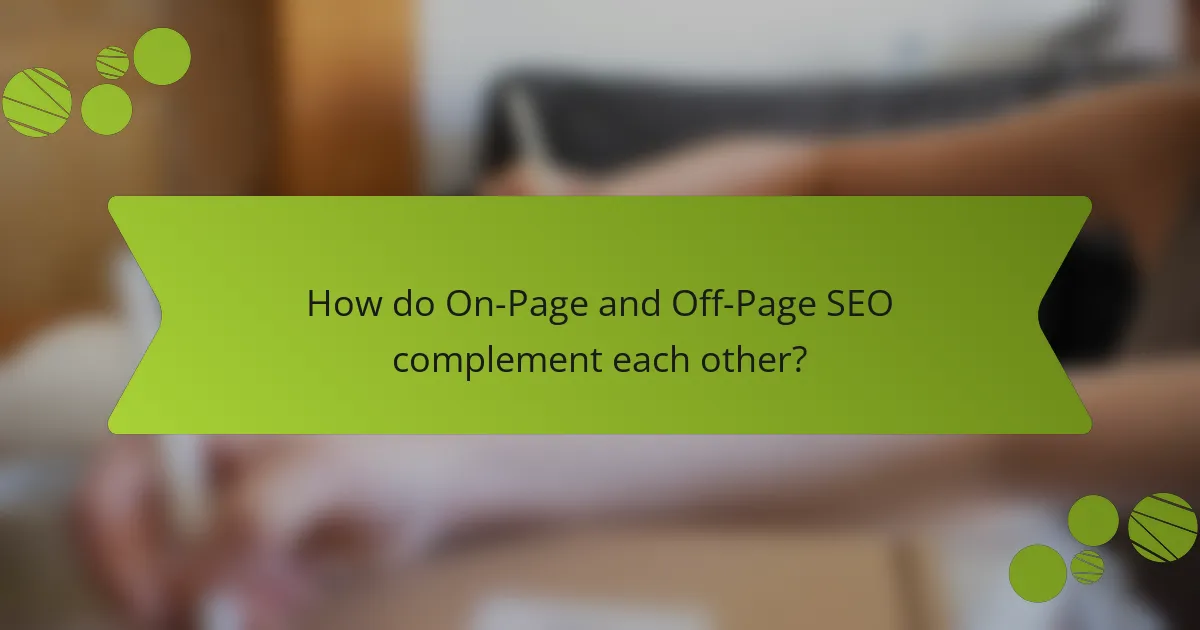
How do On-Page and Off-Page SEO complement each other?
On-Page and Off-Page SEO work together to improve a website’s visibility and authority. On-Page SEO focuses on optimizing content and structure within the site, while Off-Page SEO builds credibility through external factors like backlinks and social signals.
On-Page SEO enhances content quality for link building
On-Page SEO plays a crucial role in creating high-quality content that attracts backlinks. When content is well-structured, informative, and engaging, it is more likely to be referenced by other websites, increasing its authority and ranking potential.
To enhance content quality, focus on keyword optimization, clear headings, and multimedia elements. For example, using relevant keywords naturally within the text and including images or videos can make the content more appealing and shareable.
Common pitfalls include keyword stuffing and neglecting user experience. Ensure that the content flows well and provides genuine value to readers, as this will encourage others to link back to it.




